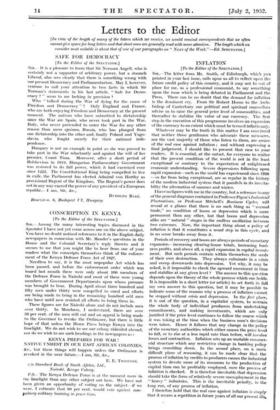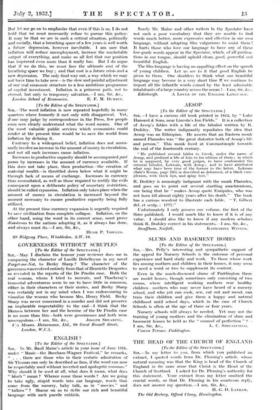INFLATION [To the Editor of the SPECTATOR.] SIR,—The letter from
Mr. Smith, of Edinburgh, which you printed in your last issue, calls upon us all to reflect upon the future credit policy of this country, and it may not be out of place for me, as a professional economist, to say something upon the issue which is being debated in Parliament and the Press. There can be no doubt that the demand for inflation is the dominant cry. From Sir Robert Horne to the Arch- bishop of Canterbury our political and spiritual counsellors advise us to raise the general price level of commodities, and thereafter to stabilize the value of our currency. The first step in the execution of this programme involves an expansion of the currency to an extent which must be termed inflationary.
Whatever may be the truth in this matter I am convinced that neither those gentlemen who advocate these measures, nor the vast majority of those who listen to them, are aware of the real case against inflation ; and without expressing a final judgement, I should like to present that case to your readers. It is essential, at the outset, for everyone to realize that the present condition of the world is not in the least exceptional or contrary to the expectation of enlightened economic understanding. Severe depressions following upon rapid expansion—such as the world has experienced since 1926 —so far from being exceptional, are so regular in the history of the modern industrial system that it parallels in its inevita- bility the alternation of summer and winter.
I have no figures with me in the country, but a reference to any of the general diagrams contained in Professor Pigou's Industrial Fluctuations, or Professor Mitchell's Business Cycles, will reveal at. a glance that there is no such thing as "normal trade," no condition of boom or depression which is more permanent than any other, but that boom and depression alike are " natural " stages in the endless oscillation between two extremes. Now, the important thing about a policy of inflation is that it constitutes a usual step in this cycle, and in no sense breaks away from it.
Periods of recovery and boom are always periods of monetary
expansion—increasing clearing-house totals, increasing busi- ness profits, and above all, a rapid expansion in capital invest- ment. But such periods contain within themselves the seeds of their own destruction. They always culminate in a crisis and sweep downwards into depression. Yet why, it may be asked, is it impossible to check the upward movement in time and stabilize at any given level ? The answer to this question depends upon the theory of the whole process which one holds. It is impossible in a short letter (or article) to set forth in full my own answer to this question, but it may be possible to indicate some of the reasons why a process of inflation cannot be stopped without crisis and depression. In the first place, it is out of the question, in a capitalist system, to restrain the whole body of individual producers from undertaking commitments, and making investments, which are only justified if the price level continues to follow the course which it was taking at the time when the business man's decisions were taken. Hence it follows that any change in the policy of the monetary authorities which either causes the price level to fall, or to rise at a less rapid rate than before, will involve losses and contraction. Inflation sets up an unstable conuner- cial structure which any restrictive change in banking policy brings crumbling down. In the second place, on a more difficult plane of reasoning, it can be made clear that the process of inflation by credits to producers causes the industrial system to devote more of its resources to the production of capital than can be profitably employed, once the process of inflation is checked. It is therefore inevitable that depression should take the form of relatively severe unemployment in the " heavy " industries. This is the inevitable penalty, in the long run, of any process of inflation.
I therefore hold that the real case against inflation is simply that it means a repetition in future years of all our present ills. But let me go on to emphasize that even if this is so, I do not hold that we must necessarily refuse to pursue this policy. It may be that we are in such a critical situation, politically and socially, that a breathing space of a few years is well worth a future depression, however inevitable. I am sure that. inflation will reduce unemployment, increase the marketable output of everything, and make us all feel that our position has unproved even more than it really has. But I do argue that if we do this, we must face the ultimate cost of the breathing space we buy ; and that cost is a future crisis and a new depression. The only final way out, a way which we may not have time to take now—is the slow and painful adjustment of our real economic structure to a less ambitious programme of capital investment. Inflation is a primrose path, not to eternal, but only to temporary salvation.—! am, Sir, &c., London School of Economics. E. F. M. DURBIN.







































 Previous page
Previous page